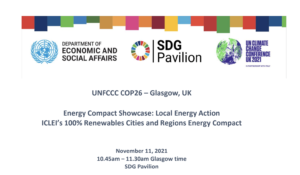COP26: ICLEI’s 100% Renewables Cities and Regions Energy Compact Showcase

Sustainable Development Goal 7 holds a unique position in the nexus between the 2030 Agenda and the Paris Agreement. Ensuring universal access to clean energy is necessary for creating sustainable economic growth and development. Although the world has made progress towards the achievement of SDG 7 in some areas, current efforts remain well below what is needed to meet the goal by 2030.
On 24 September 2021, ICLEI’s 100% Renewables Cities and Regions Energy Compact was officially launched at the United Nations High-Level Dialogue on Energy, which calls for local governments to make ambitious voluntary commitments to catapult themselves towards 100% renewable energy usage at the latest by 2050.
ICLEI’s Energy Compact complements its existing work in the renewable energy space, including the 100% Renewables Cities and Regions Roadmap project, and the 100% Renewables Cities and Regions Network. On their way to 100% renewable status, cities and regions that join ICLEI’s Energy Compact are encouraged to achieve several milestone targets by 2030 at the latest, such as achieving 100% renewable energy use in local government operations, and achieving SDG7, among others.
Energy Compacts are supported by UN-Energy, and bring together various actors committing to provide $618 billion USD in support for energy access, transition and efficiency improvements in energy infrastructures, to enhance access to electricity for more than 2.3 billion people worldwide, as well as to clean cooking possibilities for 216 million people and improvements in energy efficiency and savings. Achieving these will require dedication, innovation and collaboration by all actors involved.
ICLEI’s Energy Compact aims to align local ambition with actions set in motion at the national and international level, such as the Nationally Determined Contributions (NDCs) under the Paris Agreement, the Cities Race to Resilience campaign, and the Race to Zero campaign, and other net-zero targets, in order to mitigate the impact of the climate emergency and strengthen social, economic, and ecological resilience in light of it. Achieving 100% renewable status can act as a stepping stone towards climate neutrality. ICLEI is committed to supporting signatories of its Energy Compact on their journey towards 100% renewable status. This support includes access to peer-networking, knowledge-sharing opportunities, access to ICLEI’s Transformative Actions Program (TAP) if required, and showcasing opportunities at the international level.
Session Description:
This session will highlight key outcomes regarding local energy action from the High-level Dialogue on Energy convened by the Secretary General in September, and the work that remains to be done in the spheres of finance, policy and technology, in order to capitalize on the ambition of local governments in undertaking the renewable energy transition.
11 November 2021, 10h45 am–11h30 GMT (11h45 am–12h30 pm CET)
Speakers
Mr. Rohit Sen, Head, Climate & Energy Action, ICLEI World Secretariat, Bonn, Germany
Dr. Ing. Annette Steingrube, Research Associate and Project Manager, Fraunhofer ISE, Freiburg, Germany
Dr. Eszter Mogyorósy, Head, Innovative Finance, ICLEI World Secretariat, Bonn, Germany
Ms. Anna Skowron, Programme Manager Energy & Just Development, World Future Council and Co-Chair, Towards 100%RE Group, IRENA Coalition for Action, Hamburg, Germany
Moderator: Mr. David Koranyi, Policy Consultant, Sustainable Energy Team, Division for Sustainable Development Goals, UN Department of Economic and Social Affairs, New York, USA
Run of Show
| Time | Description |
| 10:45-10:50 | Opening remarks by moderator
Mr. David Koranyi, United Nations Department of Economic and Social Affairs |
| 10:50-11:05 | Presentation on ICLEI’s 100% Renewables Cities and Regions Energy Compact
Mr. Rohit Sen, ICLEI World Secretariat Including recorded messages from representatives of: – Dr. Ir. Hj. Sitti Rohmi Djalilah, M.Pd. Deputy Governor, West Nusa Tenggara, Indonesia Mr. Joseph Oganga County Chief Officer, Department of Energy and Industrialisation, Kisumu County, Kenya Mr. Dionisio Scarpin Mayor of Avellaneda, Argentina |
| 11:05-11:30 | Moderated panel discussion with experts in the renewable energy sphere
Technical aspects: Dr. Ing. Annette Steingrube, Fraunhofer ISE Guiding questions:
Finance: Dr. Eszter Mogyorósy, ICLEI World Secretariat Guiding questions:
Policy: Ms. Anna Skowron, World Future Council Guiding questions:
Closing remarks by moderator |

